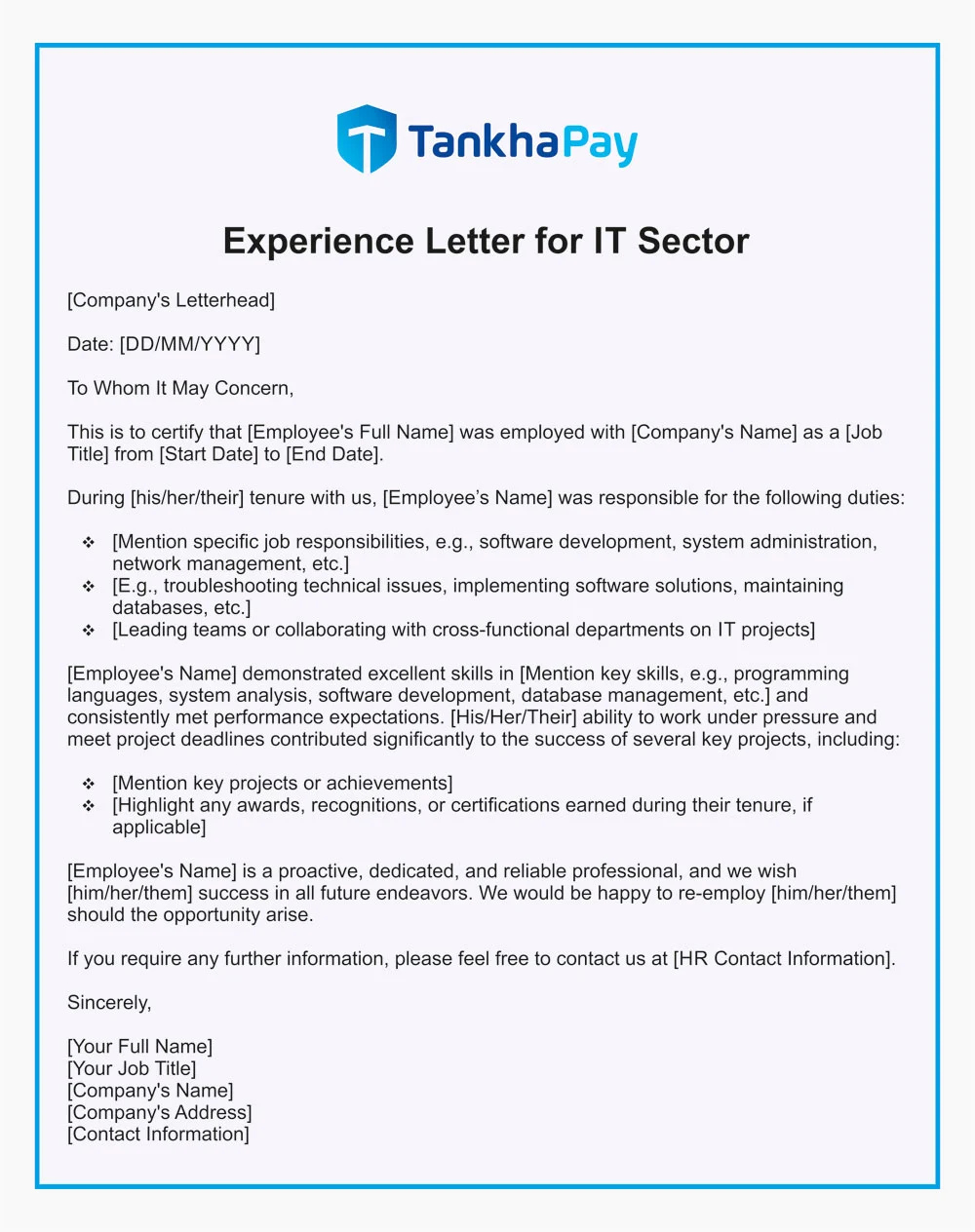Experience Letter Format for Employees
Introduction
An Experience Letter is a mandatory document verifying the experience, job role, and work done by an employee in an organization. It is a mandatory component of professional advancement as employers utilize it for verification of employment as well as making hiring decisions. But the appearance and composition of an Employee Experience Letter Format may differ according to the nature of employment. This guide provides experience letter samples for different categories of employees based on industry practices and legal demands.
Experience Letter for Employee
Major Requirements:
Full name and designation of the employee
Dates of joining and leaving
Key responsibilities and achievements
Comments and remarks by the manager
Offical company letterhead and signature
Example Format:
This is to confirm that [Employee Name] worked for [Company Name] as a [Job Title] from [Start Date] to [End Date]. While working with us, they demonstrated outstanding expertise in [state key contributions]. We value their professionalism and commitment and wish them well in their future career.
Experience Letter for Contract Employees
Key Differences from Full-Time Employees:
States clearly the term of the contract
States project or department worked in
Can include a statement of contract completion
Example Format:
[Employee Name] was with [Company Name] as a [Contract Position] between [Start Date] and [End Date] on contract basis. They were of invaluable contribution to [Project/Department]. We certify that they have successfully fulfilled their contract conditions.
Experience Letter for Freelancers & Consultants
What to Add:
Include project-based employment
Emphasize the main services rendered
Refer to the term of contract (if any)
Can be presented as a work reference or a testimonial
Example Format:
Dear [Recipient's Name],
It is to confirm that [Consultant/Freelancer Name] worked with [Company Name] as a [Role] from [Start Date] to [End Date]. They provided exceptional services in [mention major projects]. Their work was of most benefit to our business.
Experience Letter for Trainees & Interns
Key Points:
Internship/training start and end date
Projects accomplished and learnings gained
May provide the name of a supervisor or mentor
Example Format:
[Intern Name] performed successfully as an intern at [Company Name] from [Start Date] to [End Date] as [Internship Role]. They were exposed to practical experience in [list key skills]. We thank them for their commitment and diligence.
Experience Letter for Part-Time Employees
Unique Features:
Clearly mentions part-time working
Outlines weekly/monthly working hours
Emphasizes job responsibilities and performance
Sample Format:
This is to confirm that [Employee Name] was employed by [Company Name] as a [Part-Time Position] between [Beginning Date] and [Closing Date]. They were employed for [include hours per week] and provided an invaluable contribution in [list tasks]. Their work ethic and punctuality are important assets to us.
Remote Work Experience Letter for Remote Staff
Special Notes:
Clearly specify remote work schedule
List tools and digital skills to work with
Highlight key projects or deliverables
Sample Template:
[Employee Name] remotely worked for [Company Name] as a [Role] from [Start Date] until [End Date]. They efficiently worked with [mention tools such as Zoom, Slack] and were a valuable addition to [mention contributions]. We value their commitment and flexibility.
Experience Letter for Temporary & Seasonal Employees
What to Include:
Clearly mention temporary work duration
Mention seasonal or short-term work
Employer comment on performance
Sample Format:
This is to certify that [Employee Name] worked with [Company Name] as a [Temporary/Seasonal Job] from [Start Date] to [End Date]. Their performance in [state department] during peak season was excellent. We thank them for their dedication.
Experience Letter for Blue-Collar & Skilled Laborers
Major Differences:
Emphasizes technical abilities and practical work
Include adherence to safety, training, or certifications
Emphasizes work attitude and reliability
Sample Format:
[Worker Name] served at [Company Name] as [Job Title] between [Start Date] and [End Date]. He worked diligently in [state specific duties] and took each precautionary measure. We are grateful for his efforts and wish him successive best of luck.
Experience Letter for Senior Executives & Leadership Roles
Special Features:
Shifts emphasis towards leadership and strategy contribution
Places emphasis on accomplishments and business results
May be accompanied by a personally signed endorsement by the senior management
Sample Formatted:
[Executive Name] was [Designation] in [Company Name] from [Start Date] to [End Date]. His/her [mention department] experience played an important role in [business achievements]. We acknowledge their leadership quality and contribution.
Legal Aspects of Experience Letters for Various Types of Employees
Experience letters are not mandatory according to Indian labor legislation but are recommended to be given by employers in order to preserve good employment practice.
Employees can formally apply for an experience letter if not given.
In case the employer refuses an experience letter, employees can:
Employ appointment letters or payslips as proof
Report to labor authorities in case of any discrepancy
Employ other employment proofs such as resignation acceptance emails
Common Mistakes in Experience Letters for Various Employees & How to Correct Them
Common Mistakes:
Incorrect job title or dates of service – Always check company records.
Spelling error of the employee's name – Ensure proper verification documents before issuance.
Employer details missing – Always mention company name, address, and contact details.
Officer signature/stamp missing – Makes the letter unofficial and illegitimate.
Job responsibilities missing – Essential in the background verification.
What is the process to correct a wrong Experience Letter?
Employees must apply for corrections in writing officially.
Produce supporting documents like payslips or appointment letters.
Employers should issue a corrected version on official letterhead.
Conclusion
An Experience Letter Format varies depending on the kind of employee, but it fulfills the same goal—to authenticate work experience and facilitate career growth. Employers have to ensure they issue clear and precise experience letters for all employees to ensure compliance with professional standards and labor laws. Employees have to ensure they request and retain proper documents for their career growth.

Comments
Post a Comment